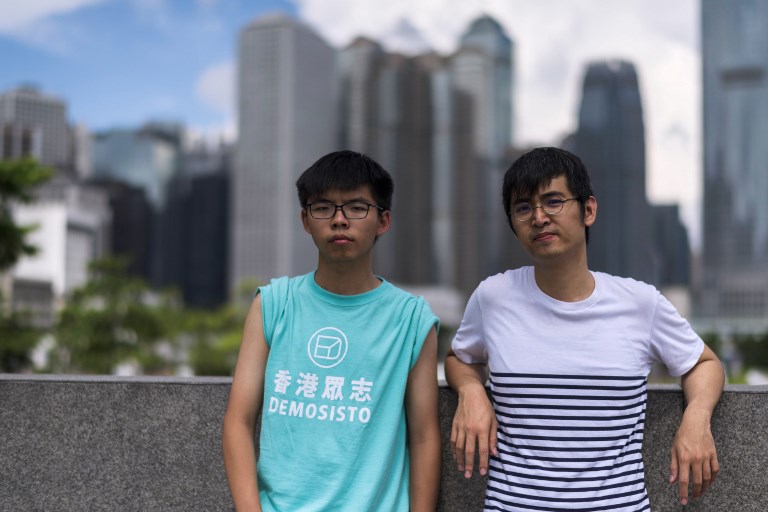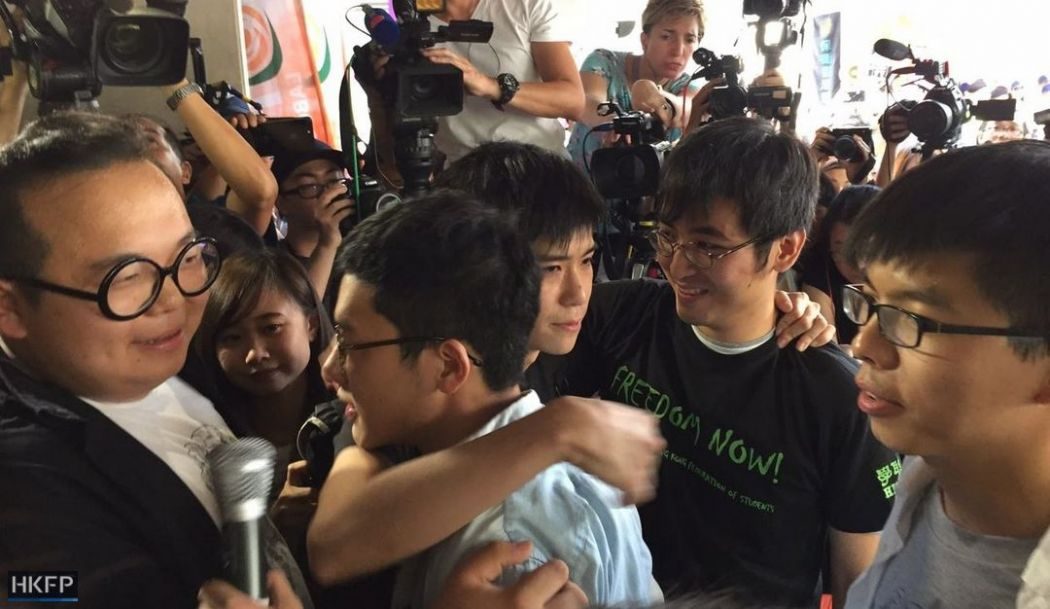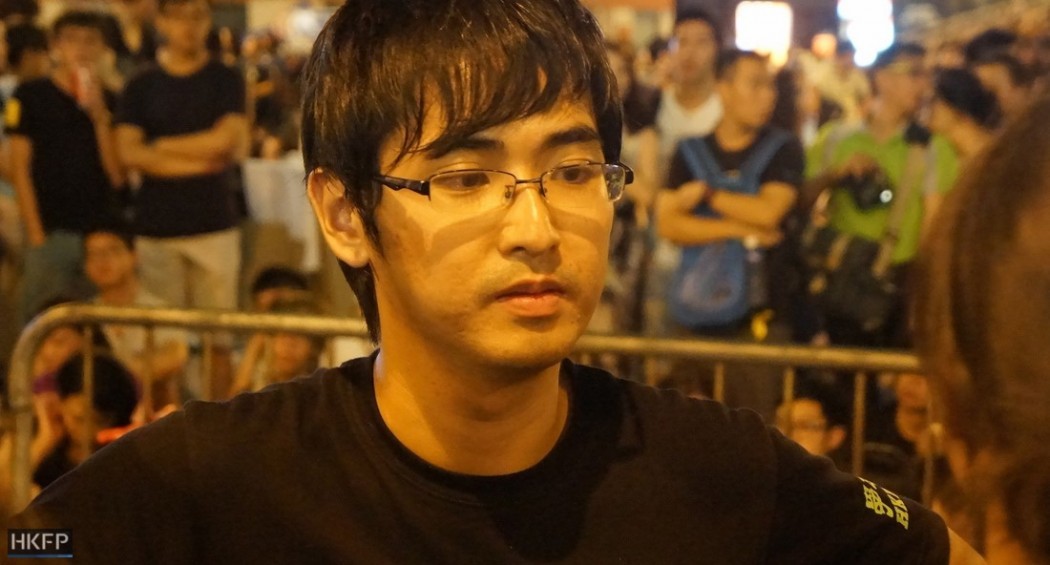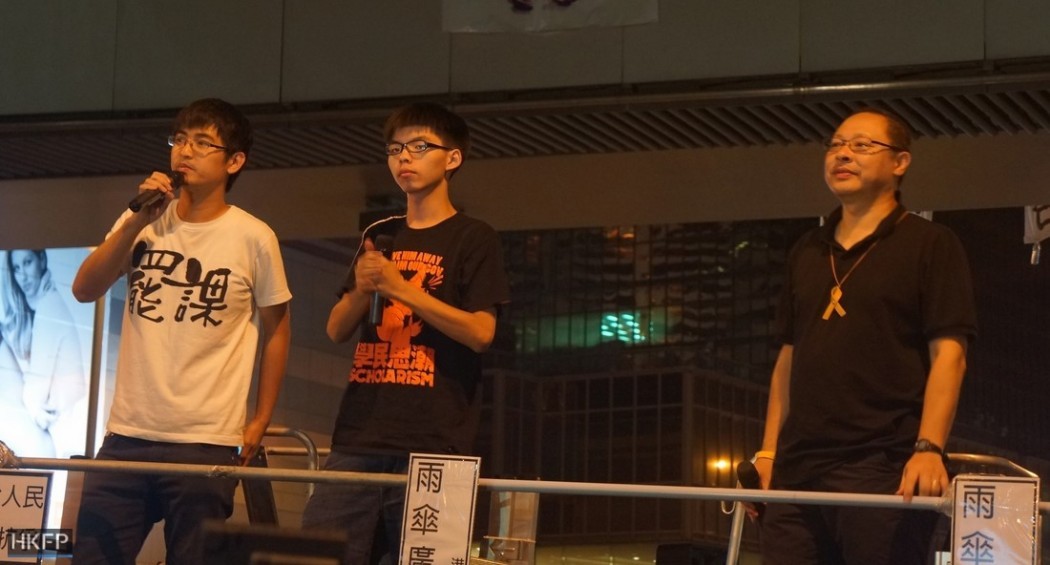The appeal court on Thursday jailed three activists – Nathan Law, Joshua Wong and Alex Chow – over their involvement in the Civic Square clash that sparked the 2014 Occupy protests. The trio were originally given community service sentences and a suspended jail term for their unlawful assembly convictions, but the Department of Justice applied for a sentence review. The activists were subsequently sentenced to six to eight months in prison following the ruling on Thursday.

Below are some key excerpts from the judgement handed down in the case:
Judge Wally Yeung, Court of Appeal Vice President
“[I] stress that according to the Basic Law and the Bill of Rights Ordinance, Hong Kong residents enjoy freedom of assembly, speech, march, demonstration, and other methods of expression…
“However, these freedoms are not absolute or without restrictions, and have to be in accordance with the law… [If one] uses the guise of exercising freedom of assembly, but is in actual fact destroying public order and peace, [this] will plunge society into chaos, and will have a negative impact societal progress and development, as well as prevent others from exercising their rights and freedoms. If these situations are not prevented, any talk of freedom and rule of law is empty.”
“There has been an unhealthy trend in Hong Kong society in recent years, in that there are those uses pursuing ideals or their freedom to exercise rights granted by the law as an excuse to engage in illegal activity. Some people, including academics, promote slogans such as ‘disobey the law to achieve justice’, to encourage others to break the law.”
“These people publicly express contempt of the law, [and] not only do they refuse to admit that their illegal activity is wrong, but they even view it as honourable or proud acts. These arrogant, self-righteous thoughts, unfortunately have an impact on some young people, causing them to casually commit acts which destroy public order and peace during gatherings or demonstrations… This case is a perfect example of this unhealthy trend.”

“The three defendants must have known that when a huge crowd force their way into Civic Square, it would most definitely lead to clashes between them and the security guards of Civic Square, and it was highly possible that there would be injuries and deaths, and destruction of property.”
“The three defendants… knew their actions were illegal, but still took part and incited others, especially young students, to do so, which was very irresponsible, as the students could have to live with regret for the rest of their lives.”
“The three defendants’ banners of peace and rationality, claiming to take Civic Square completely without violence, were empty words… and they were lying to both themselves and others.”
‘Their concern about society, passion in politics and ideals, and their need to obey the law are not in conflict at all.”
“The offences committed by the three defendants are serious and there should be a deterrent effect. [I] believe that based on the nature of the charges, the method of committing the crime, and the attitudes of the three defendants, community service or suspended jail was an extremely inadequate sentence and absolutely does not reflect the gravity of the offence.”
“I believe the only appropriate sentence is immediate imprisonment for a short period of time. I should stress, that if the court’s sentence is insufficient in deterring similar crimes, the court may have to impose sentences of a greater deterrent effect so as to defend the dignity of rule of law.”

“The court is not happy to have to make a ruling that sentences young people with aspirations and ideals to immediate imprisonment. However, the duty of the court is to send a clear message to society that in exercising your rights, engaging in assemblies, marches and demonstrations, the participant must obey the law and not destroy public order and peace. Any violent behaviour, especially that which attacks law enforcement or those maintaining order, would result in severe punishments.”
“Otherwise, society will not have harmony or progress; the power and freedom of the law to protect civilians would be non-existent.”
Judge Jeremy Poon
“If we don’t defend public order, society will easily fall into a state of anarchy; once that happens, society and the public will be greatly harmed… Once those who take part in assemblies cross the boundaries defined by the law, they will immediately lose the protection given to them under the law of the right of assembly, and have to bear legal consequences. These offenders cannot say that the law is taking away or oppressing their freedom of speech and assembly, because the law never allowed them to use illegal methods to exercise these freedoms in the first place.”
“Under the premise of defending public order, as well as the charges of unlawful assembly, the court in handing down the sentence has to, apart from giving the appropriate sentence to the offender, consider the deterrence effect, so as to deter both the offenders from committing the offence again, and warn others not to test the law and do the same with regards to destroying public order.”
“With regards to personal circumstances, however noble you believe your reasons or motives are, or whether other offenders bear a heavier level of criminal responsibility, none of these are strong reasons for asking for a lighter sentence.”
Judge Poon’s reasons for deciding that the first instance judge erred in sentencing are as follows:
- The first instance judge ultimately did not consider the deterrent element of sentencing, and gave too much weight to the defendant’s personal circumstances, motives and other factors;
- The first instance judge did not see the case as involving seriously violent behaviour. [S]he failed to see that this is a large scale unlawful assembly, and the risk of violence was very high;
- The first instance judge believed that even though the security guard was injured in the incident, there was no evidence to show that the defendants played a role in causing this. However, as stated above, judging by the objective circumstances, the defendants must have been able to reasonably predict that the actions would involve clashes with the police and security, and it was inevitable that the security officers would be injured. But she failed to consider this.
- The first instance judge believed that the respondents were sincerely only intending on entering Civic Square, which has historical and symbolic significance, but failed to consider that on the night of the events, Scholarism and the Hong Kong Federation of Students had finished their assembly on the road across from the Central Government Complex, and the complex was closed; they do not have an absolute right to have an assembly there, yet they forced their way in, and encouraged and incited others to do so. This is not only arrogant, but is also disrespecting the law.
- The first instance judge gave too much weight to whether or not the defendants were remorseful… they did not deny what they have done, and said they respected the court, and was willing to bear legal consequences, [but] their so-called remorse was only on the surface level and should not be given too much weight.

Judge Derek Pang
“With regards to feeling very strongly about a subject matter, and hoping to express what one believes more thoroughly, in hopes that there would be development on these matters, this is completely understandable. However, in the relevant process, treating the law which has long been in effect as an unreasonable obstruction to freedom of expression, and in casually doing so while feeling good about themselves, this is not behaviour which the court has any reason to deal with leniently.”
“I hope to stress again that what is considered ‘non-violent’ is to be understood according to common sense. If someone knows that another is exercising their duty to prevent him from entering another place, but he deliberately rushes or pushes forward with speed and weight, then it is only natural that there would be physical clashes.”
“If those who push ahead outnumber the people who are on the defence, then the physical threat the former is bringing to the latter is real and cannot be underestimated. Believing that not attacking someone physically means ‘non-violent’ is invalid.”
